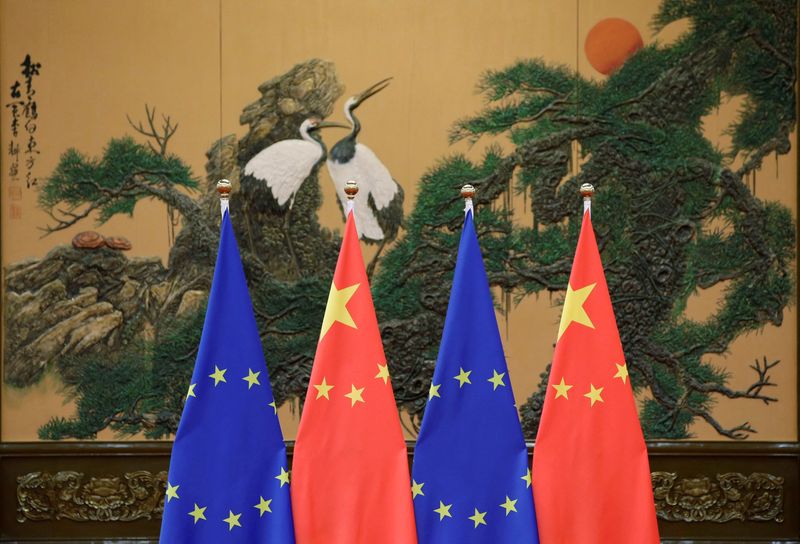Joe Cash and Ryan Wu
BEIJING (Reuters) – Beijing is urging the European Union to remove provisional tariffs on Chinese-made electric vehicles by July 4 after China and the EU agreed to hold new trade talks, state media Global Times reported.
The European Union is investigating what it calls excessive and unfair subsidies, but temporary tariffs of up to 38.1% on imports of Chinese-made EVs are due to come into effect by July 4.
China has repeatedly called on the EU to roll back the tariffs and expressed a willingness to negotiate. Beijing, hurt by U.S. tariffs imposed by the Trump administration on Chinese goods, does not want to get drawn into a new tariff war but has said it will do all it can to protect Chinese companies if it does.
Following a phone call on Saturday between EU Commissioner Valdis Dombrovskis and his Chinese counterpart, during the German economy minister’s visit to China, the two sides agreed to resume talks. Dombrovskis said the door was “open” for talks.
“Vice President Dombrovskis and China’s Minister of Commerce Wang Wentao held a frank and constructive telephone conversation on Saturday regarding the EU’s anti-subsidy investigation into electric cars produced in China,” a European Commission spokesman said.
“The EU side stressed that any negotiated outcome on the investigation must be effective in resolving harmful subsidies,” it added.
China’s Global Times reported, citing observers, that the best outcome would be for the EU to withdraw its tariff decision by July 4.
He warned that any stronger protectionist moves from the EU would lead to countermeasures and that escalating trade tensions would only lead to a “lose-lose” outcome for both sides.
The tariffs are due to be finalised on November 2nd following the conclusion of the EU’s anti-subsidy investigation.
China’s Commerce Ministry did not immediately respond to a Reuters request for comment.
Trade war?
EU trade policy has become increasingly protectionist amid concerns that China’s production-focused development model could lead to a flood of cheap manufactured goods as Chinese companies seek to boost exports at a time when domestic demand is sluggish.
China denies accusations that it has unfair subsidies and overcapacity, and says its EV industry development is the result of its advantages in technology, markets and industrial supply chains.
“When European Commission President von der Leyen announced the investigation into Chinese new energy vehicles, I had a hunch that it was not only an economic issue, but also a geopolitical one,” said Zhang Yansheng, chief researcher at the China Center for International Economic Exchanges.
“I think it’s unfair to start a tariff war just based on capacity utilization and demand shortfalls,” he added.
Trade ties between the 27-nation European Union and the world’s second-largest economy soured sharply in May 2021 after the European Parliament voted to freeze ratification of what would have been a landmark investment pact, citing retaliatory sanctions over alleged human rights abuses in China’s Xinjiang Uighur Autonomous Region.
The two countries clashed again the same year when China downgraded diplomatic ties with Lithuania and ordered multinational companies to cut ties with the Baltic state after Vilnius invited democratic Taiwan, which China claims as part of its territory, to open a representative office in the capital.
Armed and ready
China has called for talks but is prepared to retaliate if the EU does not budge, and has also suggested it believes Brussels is entirely to blame for the escalating tensions.
The Global Times, which first reported that China was considering launching a retaliatory anti-dumping investigation into European pork imports, which the Commerce Department confirmed last week, also reported that China had launched an anti-subsidy investigation into European dairy products and tariffs on heavy gasoline vehicles.
Chinese authorities have hinted at possible retaliatory measures in commentary in state media and interviews with industry insiders.
“It seems likely that the Chinese government will raise tariffs by as much as 25 percent on European-made cars with engines larger than 2.5 liters,” said Jacob Gunther, chief analyst at MERICS, a Berlin-based China research institute.

“Pork and dairy are already on Beijing’s agenda, and other agricultural products will probably come under threat as well,” he added.
“On the EU side, there are a number of investigations underway, and we can expect some action to be taken targeting fraudulent (Chinese) products, from medical equipment to airport security scanners to steel pipes.”

